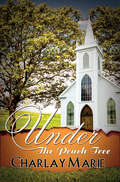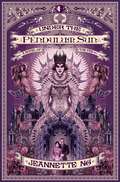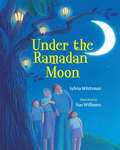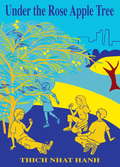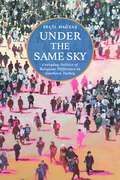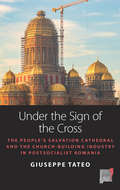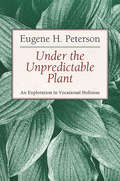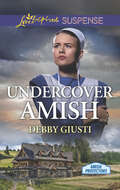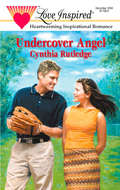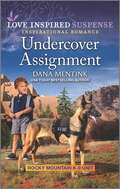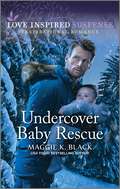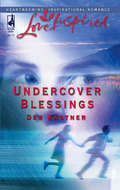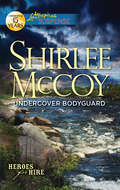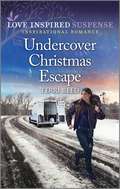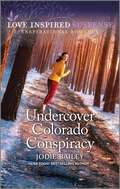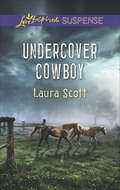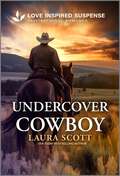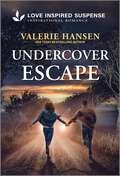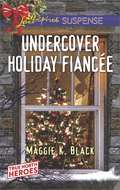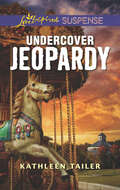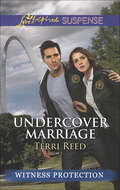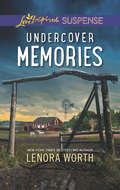- Table View
- List View
Under the Peach Tree
by Charlay MarieHope grew up feeling ugly and unloved. Called "the devil" by her mother, she was not allowed to attend church on Sundays with her twin sister, Faith. At fifteen, Hope is wild. She no longer cares about her mother, or anyone else for that matter.When her mother kicks her out of the house, Hope spends several days homeless and alone--until she runs into an elderly blind prophetess named May. She offers Hope a gift from God: a new home where she is taught the true meaning of love, family, and God.When Hope meets Dante, a quirky yet attractive boy who visits with May every day, her life changes even more. With young love in the air, Hope feels like nothing can go wrong. But just when she thinks her life is perfect, she learns that May is dying of cancer. Hope must learn how to conquer her deepest fears and have faith that all things work together for the good of God. With everything she's experienced in her young life, will she be able to trust God?
Under the Pendulum Sun
by Jeannette NgVictorian missionaries travel into the heart of the newly discovered lands of the Fae, in a stunningly different fantasy that mixes Crimson Peak with Jonathan Strange & Mr Norrell. Catherine Helstone’s brother, Laon, has disappeared in Arcadia, legendary land of the magical fae. Desperate for news of him, she makes the perilous journey, but once there, she finds herself alone and isolated in the sinister house of Gethsemane. At last there comes news: her beloved brother is riding to be reunited with her soon – but the Queen of the Fae and her insane court are hard on his heels.File Under: Fantasy [ In Arcadia | Seek and Hide | The Queen of Moths | Lands of the Damned ]
Under the Ramadan Moon
by Sylvia Whitman Sue WilliamsWe wait for the moon. We watch for the moon. We watch for the Ramadan moon.We give to the poor, and read Qur'an, under the moon.We live our faith, until next year under the moon, under the moon, under the Ramadan moon. Ramadan is one of the most special months of the Islamic year, when Muslims pray, fast, and help those in need. Sylvia Whitman's lyrical story, with luminous illustrations by Sue Williams, serves as an introduction to Ramadan--a time for reflection and ritual with family and friends. A detailed note about Ramadan is included. The author lives in Virginia and wrote this story so her son's classmates could learn how he and his family celebrate this important time. The illustrator lives in England. <p><p> <i>Advisory: Bookshare has learned that this book offers only partial accessibility. We have kept it in the collection because it is useful for some of our members. Benetech is actively working on projects to improve accessibility issues such as these.</i>
Under the Rose Apple Tree
by Thich Nhat Hanh Philippe AmesIn this sequel to A Pebble for Your Pocket, Zen teacher and poet Thich Nhat Hanh looks deeply at the issues that confront young people in today's society. Applying his unique insights to anger, family conflict, drug use, and sexual responsibility, he makes the ancient teachings of the Buddha relevant to adolescents by offering mindfulness practices as tools to help transform the suffering in their everyday lives. Ages 10-13."By living your life beautifully, you can nourish your sisters, brothers, and future generations. It is not through sacrificing your life that you help future generations, it is by living fully and happily." - Thich Nhat Hanh, from Under the Rose Apple Tree
Under the Rose Apple Tree
by Thich Nhat Hanh Philippe AmesIn this sequel to A Pebble for Your Pocket, Zen teacher and poet Thich Nhat Hanh looks deeply at the issues that confront young people in today's society. Applying his unique insights to anger, family conflict, drug use, and sexual responsibility, he makes the ancient teachings of the Buddha relevant to adolescents by offering mindfulness practices as tools to help transform the suffering in their everyday lives. Ages 10-13.
Under the Same Sky: Everyday Politics of Religious Difference in Southern Turkey
by Seçil DaǧtașAn ethnographic study of the everyday lives of religious minorities near Turkey’s border with SyriaHow do people coexist in a world shaped by longstanding differences, political instability, and recurrent displacement? In Under the Same Sky, Seçil Daǧtaș addresses this question by exploring the everyday politics of religious difference among minority communities in Turkey’s southern borderlands.In a region often portrayed through the lens of conflict and division, this ethnography brings to life the subtle, often overlooked negotiations occurring in social spaces such as bustling city bazaars, shared worship sites, interfaith unions, home gatherings, and a multireligious choir. Set against the backdrop of major political upheavals in Turkey and Syria before the 2023 earthquakes devastated the region, the book demonstrates how Arab ‘Alawis, Christians, and Jews, alongside their Sunni Muslim neighbors, use familiar social idioms—kinship, hospitality, love, and companionship—to reproduce religious differences.Daǧtaș argues that religious difference is more than an identity marker for these communities, as it is often treated in studies focused on statecraft or political movements. It is a dynamic aspect of social relations which is constantly redefined by race, class, citizenship, and gender, and unsettled by overlapping practices and multireligious belonging. Under the Same Sky focuses on religious difference as lived and reworked in daily encounters—within the larger context of a majoritarian Turkish Sunni state—inviting readers to reconsider secularism, religious plurality, and the nature of political life.
Under the Shadow of the Rising Sun: The True Story of a Missionary Family's Survival and Faith in a Japanese Prisoner-of-War Camp During W. W. II
by Donald Ernest Mansell Vesta West MansellA WWII memoir of prison and Providence. 18-year-old Donald Mansell, his brother and parents were sailing to Africa as missionaries when America plunged into World War II. Fleeing for safety to the Philippines, they instead found themselves prisoners of the Japanese army, spending the next three years in a concentration camp. Donald's world revolved between hunger, weevils, lack of privacy, and numbing routine. He witnessed torture and brutality, fought off despair, and escaped death several times. Under the Shadow of the Rising Sun is an honest, gripping, sometimes whimsical account of daily life as a prisoner of war. Through the eyes of a survivor, we discover the role of trials in developing faith, and we see the intervention of a merciful Providence in an unforgettable true-life adventure.
Under the Sign of the Cross: The People’s Salvation Cathedral and the Church-Building Industry in Postsocialist Romania (Space and Place #18)
by Giuseppe TateoBased on extensive ethnographic research, this book delves into the thriving industry of religious infrastructure in Romania, where 4,000 Orthodox churches and cathedrals have been built in three decades. Following the construction of the world’s highest Orthodox cathedral in Bucharest, the book brings together sociological and anthropological scholarship on eastern Christianity, secularization, urban change and nationalism. Reading postsocialism through the prism of religious change, the author argues that the emergence of political, entrepreneurial and intellectual figures after 1990 has happened ‘under the sign of the cross’.
Under the Unpredictable Plant: An Exploration in Vocational Holiness
by Eugene H. PetersonIn Under the Unpredictable Plant respected pastor, author, and educator Eugene Peterson clarifies the pastoral vocation by turning to the biblical book of Jonah, in which he finds a captivating, subversive story that can help pastors recover their "vocational holiness". Using the Jonah story as a narrative structure, Peterson probes the spiritual dimensions of the pastoral calling and seeks to reclaim ground taken over by those who are trying to enlist pastors in religious careers. Under the Unpredictable Plant: An Exploration in Vocational Holiness is the third of three books on the work of pastors in North America. The three books together are designed to provide a biblical orientation and theological understanding in cultural conditions decidedly uncongenial to such orientation and understanding. This third volume uses the narrative of Jonah as a structure for recovering the spiritual dimensions of the pastoral vocation in an age that relentlessly secularizes it into career development. Holiness, the cultivated habit of responding to God word instead of fitting into the world's program, emerges as the vocational distinctive. The first two books in the series are Five Smooth Stones for Pastoral Work and Working the Angles: The Shape of Pastoral Integrity.
Under the Unpredictable Plant: An Exploration in Vocational Holiness
by Eugene PetersonLike Eugene Peterson's other books on pastoring, Under the Unpredictable Plant is full of stimulating insights, candid observations, and biblically grounded prescriptions. Yet this book emanates with a special poignancy out of Peterson's own crisis experience as a pastor. Peterson tells about the "abyss," the "gaping crevasse," the "chasm" that he experienced, early in his ministry, between his Christian faith and his pastoral vocation. He was astonished and dismayed to find that his personal spirituality, his piety, was inadequate for his vocation -- and he argues that the same is true of pastors in general. In the book of Jonah -- a parable with a prayer at its center -- Peterson finds a subversive, captivating story that can help pastors recover their "vocational holiness." Using the Jonah story as a narrative structure, Peterson probes the spiritual dimensions of the pastoral calling and seeks to reclaim the ground taken over by those who are trying to enlist pastors in religious careers.
Undercover Amish: Second Chance Amish Bride Undercover Amish (Amish Protectors)
by Debby GiustiHunted by criminals, a woman joins an ex-cop as Undercover Amish in this romantic suspense novel from an award-winning author.After Hannah Miller’s mother is murdered and her sisters go missing, someone comes after her. Now the only way she can survive is to entrench herself in an Amish community—and rely on Lucas Grant, a former police officer who is planning to join the Amish faith, for protection.But finding refuge for Hannah—disguised as Plain at a secluded inn—pulls Lucas back into his old life. And when Lucas discovers the criminals after them may be the people who killed his partner, the mission to take them down becomes personal. With the assailants closing in, though, can Lucas stop them—and finally put his past behind him to start an Amish life with Hannah?Amish Protectors seriesAmish RefugeUndercover AmishAmish RescueAmish Christmas Secrets
Undercover Angel
by Cynthia RutledgeAngel Morelli, a beautiful undercover cop, poses as a student to bust a drug ring. Unexpectedly, she falls in love with her handsome history teacher, Jake. After realizing who she really is, Jake quickly falls in love, allowing him to make peace with his troubled past and find his way back to God.
Undercover Assignment (Rocky Mountain K-9 Unit #4)
by Dana MentinkFrom USA TODAY bestselling author Dana Mentink. This K-9 will stop at nothing to keep a child safe When a little boy is threatened, Officer Daniella Vargas and K-9 partner, Zara, are assigned to pose as his nanny to uncover the culprit&’s identity. Suspecting one of the guests in his inn, widower Sam Kavanaugh&’s only option is to begrudgingly trust Daniella and Zara to help. But can they solve the case and its mysterious connection to Sam&’s late wife before it&’s too late?From Love Inspired Suspense: Courage. Danger. Faith.Rocky Mountain K-9 Unit Book 1: Detection Detail by Terri ReedBook 2: Ready to Protect by Valerie HansenBook 3: Hiding in Montana by Laura ScottBook 4: Undercover Assignment by Dana MentinkBook 5: Defending from Danger by Jodie BaileyBook 6: Tracking a Killer by Elizabeth Goddard
Undercover Baby Rescue
by Maggie K. BlackThis officer will do anything to save his stolen newborn nephew… A dangerous organization is kidnapping and trafficking newborns—and Officer Justin Leacock&’s nephew is their latest victim. To save the stolen baby, Justin will have to go undercover as a married couple with his former fiancée, Detective Violet Jones. Except finding the boy isn&’t enough. Now they must outwit the kidnappers on their tail and survive the ruthless icy wilderness, too…From Love Inspired Suspense: Courage. Danger. Faith.
Undercover Blessings
by Deb KastnerWorking undercover to protect a mother and child from the kidnappers whose crime the mother witnessed, an FBI agent soon finds himself falling in love. Original.
Undercover Bodyguard
by Shirlee MccoyBakery owner Shelby Simons can't deny a stalker is after her. Still, knowing she's at risk is one thing. Admitting she needs a bodyguard is quite another. Especially when the bodyguard is Ryder Malone. The former SEAL is too big, too tough and way too attractive. Yet Ryder won't take no for an answer. If she can't find a place for him in her life, he'll make one, working undercover to protect Shelby and find her attacker. But as Ryder and Shelby get closer to answers-and each other-the killer starts closing in....
Undercover Christmas Escape
by Terri ReedAn undercover mission has deadly consequences The assignment was simple: infiltrate an office Christmas party, gather evidence and take down a drug cartel. However, DEA agent Duncan O&’Brien and deputy US marshal Sera Morales encounter more than they were expecting when masked thieves crash their undercover operation and abduct Sera, who narrowly escapes. Can Duncan and Sera work together, despite their competitiveness and hidden attraction, to capture a merciless drug lord—before this Christmas becomes their last?From Love Inspired Suspense: Courage. Danger. Faith.
Undercover Colorado Conspiracy
by Jodie BaileyAn undercover mission turns into a fight for survival To expose a crooked adoption agency, military investigators Thalia Renner and Phillip Campbell pose as a married couple at a mountain resort. But when they become the target of unknown enemies and deadly assaults, they wonder if their cover has been blown. As they investigate, they learn the truth is far more sinister…and the consequences could cost them their lives. From Love Inspired Suspense: Courage. Danger. Faith.
Undercover Cowboy
by Laura ScottRunning from the MobFBI agent Logan Quail puts his life and career in jeopardy when he blows his cover to save Kate Townsend from a mafia goon. He wasn't able to save his fiancée from Bernardo Salvatore's violent syndicate, but this time he'll make sure that Kate Townsend doesn't get herself killed trying to prove her father was murdered. Now Logan and Kate must work together, each overcoming their separate grief, to bring down a ruthless mob boss. And maybe find some peace through the healing power of love.
Undercover Cowboy: A Thrilling Western Suspense Romance
by Laura ScottWith targets on their backs, there&’s no safe place to hide in this Western romantic suspense from USA TODAY bestselling author Laura ScottFBI agent Logan Quail risks his life and career when he blows his cover to save Kate Townsend from the mafia&’s clutches. Determined to avenge his fiancée&’s murder, he must work with Kate to take down the mob while trying to uncover the truth behind her father&’s suspicious death. But as they dig deeper into a web of corruption, danger continues to follow their every move. With time running out, can Logan and Kate bring the ruthless criminals to justice…before they become the next victims?Previously published.
Undercover Escape
by Valerie HansenA prison break gone wrong… and a fugitive out for revenge. Going undercover as a convicted killer is state trooper Rafe McDowell&’s best shot at shutting down a human trafficking ring. But when a surprise jailbreak ruins his plans and puts the prison&’s dog trainer, Hannah Lassiter, in danger, he must take her, her grandmother and their dog on the run from the mastermind behind the ring. With his fugitive target now after them, maintaining his cover is the only way to catch the criminal. But as the escalating attacks turn deadly, can he convince Hannah to trust him in order to keep them all alive?From Love Inspired Suspense: Courage. Danger. Faith.
Undercover Holiday Fiancée
by Maggie K. BlackTHE ENGAGEMENT ASSIGNMENT While investigating a dangerous drug ring, Detective Chloe Brant witnesses a hostage situation...and gets pulled into a case that could make her career. But to bring down rival drug-dealing gangs, she has to pose as the fiancée of Detective Trent Henry-the man who broke her heart the last time they were undercover together. Trent's been undercover so long, he can't let anything blow this case...even his growing feelings for his temporary fiancée. But when Trent comes face-to-face with his past, a killer makes Chloe a target. And for the first time, the danger of his job is personal...because if Trent wants his pretend romance to become real, he and Chloe must stay alive.
Undercover Jeopardy: Justice Mission Identity: Classified Undercover Jeopardy (Mills And Boon Love Inspired Suspense Ser.)
by Kathleen TailerA detective and an FBI agent find their love rekindled during a deadly undercover reunion in this gripping thriller from the author of Quest for Justice.Taken hostage in a bank robbery, the last person Detective Daniel Morley expects to find disguised as a robber is his ex-fiancée, FBI agent Bethany Walker. Now, with a mole in law enforcement putting Bethany’s life in danger, Daniel must join her undercover to protect her. But can this pretend couple confront the issues that ended their real relationship . . . and stay alive to claim a future together?
Undercover Marriage (Witness Protection)
by Terri ReedLaw enforcement agents pose as husband and wife to break a child trafficking ring in this inspirational romantic suspense.An illegal adoption ring—using kidnapped babies—has to be stopped. To gather the necessary evidence, US marshal Serena Summers goes undercover—as a married woman desperate for a baby. Her “husband” is her own partner, US marshal Josh McCall, whom Serena blames for her brother’s death. How can she act like a loving wife when she has to constantly fight her feelings for a man she isn’t sure she can trust? The closer they get to unraveling the dark web of deceit, though, the more being Josh’s undercover wife means putting her life—and future—in his hands.
Undercover Memories: Undercover Memories In Too Deep Framed For Christmas (Mills And Boon Love Inspired Suspense Ser.)
by Lenora WorthIn the New York Times–bestselling author’s Western romantic thriller, a cowboy detective must protect a private investigator with a secret past.No one knows how Galveston PI Emma Langston wound up in the alley behind a suspicious bar in Dallas. Badly wounded and suffering from amnesia, her story is a complete mystery. But one thing is clear to Detective Ryder Palladin—someone wants Emma dead, and he’s the only one who can help her. When Ryder brings Emma to his family ranch for protective custody, she might be safe from the men pursuing her, but she faces the risk of falling for the handsome cowboy. Before she can untangle her feelings for Ryder, Emma must recover her memory . . . because she’s sure someone’s life depends on it, even if she can’t remember whose.
